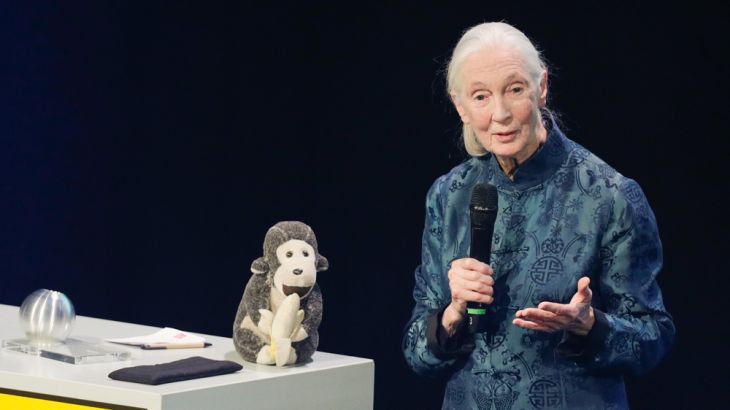
Jane Goodall: Chimpanzees, humanity and all that binds them
Primatologist Jane Goodall discusses a lifetime of studying the animal with the closest DNA to man.
Widely seen as the world’s leading primatologist and conservationist, Jane Goodall has an unparalleled understanding of chimpanzees.
Goodall’s study of chimpanzees, human beings’ “closest living relatives on earth”, began in 1960 when she travelled to Tanzania for this sole purpose. Her moment of international recognition came with the broadcast of the documentary ‘Miss Goodall and the Wild Chimpanzees’ across the United States.
Keep reading
list of 4 itemsHong Kong’s first monkey virus case – what do we know about the B virus?
Indonesia hunts for ‘extinct’ Javan tiger
In Colombia, hunting poachers, not drug traffickers
Unless we have new generations growing up to better understand our relationship with the natural world, then soon there will be nothing left.
However, Goodall’s career hasn’t always been embraced by society. As discoveries were made establishing the real biological and behavioural similarities between chimpanzees and human beings, the resistance in both the press and general public grew, the main point of contention being how a woman – without a university degree – could make such claims about humanity.
As science backed the facts Goodall continued to uncover, those issues were more or less laid to rest; but the peoples’ trust in science and what studying chimpanzees could tell us about humanity, especially whether aggression was an innate trait or something learned, was a real political predicament.
“At that time, in the early 1970s, it was a political issue. Science was divided as to whether human infants are born with a clean slate, everything is learned from your culture, your society, from your mother … I was saying, no, some things are inherited, it’s instinctive – I know as a mother. When your child is threatened you get this surge of adrenaline and sometimes anger. It’s not rational, but it’s there,” Goodall recalls.
“It’s mostly people who don’t want to admit that animals have personalities, minds, and above all, emotions.”
In light of an upcoming visit to chimpanzee sanctuary Ngamba Island, Goodall also recalls the maltreatment and abuse of primates at the Entebbe zoo when she first visited Uganda under then-president Idi Amin’s rule.
“They [Entebbe zoo] had about eight or nine infant chimps whose mothers had been shot for bushmeat. They didn’t have proper cages … they had nothing to do. They were very disturbed. I managed to find [the chimps] a zookeeper from London Zoo. Gradually they built up proper cages … and one of the things that she did was give them paper and paint brushes. Some of them paint fine shapes, circular shapes … they began selling them, which raised money. That was the beginning of it. The island was created for orphan chimps whose mothers were either killed for bushmeat or they were poached, so the infants could be sent off and sold as pets or entertainment,” says Goodall.
Asked about the challenges facing conservationists in Africa, Goodall says, “you cannot expect change to happen over night after our brutal colonialism …. We ruined their culture, we ruined so much about African society. What white colonialists did can never really be forgiven in Africa.”
“I travelled to many different countries, and everywhere the history of white colonialism is brutal. So when finally the Europeans thought ‘oh gosh, we’ve killed off nearly all the animals, we can develop tourism ‘… we set up these national parks. People were driven out of these areas and lived on the periphery – many of them in poverty.
“When I flew over Gombe National Park in 1990 and looked down … it was a tiny island of forest, it was the smallest national park in Tanzania – surrounded by completely bare hills. More people living there than the land can support … They were struggling to survive.
“That’s when it hit me: if we don’t do anything to help the people, we may as well give up conservation.”
Although Goodall has never personally been threatened by those whose interests she may challenge, such as wildlife poachers, the resistance to understanding the interconnectedness of humanity, animals and the environment is something she has tirelessly worked to rectify.
“It is our society [the developed world] that were raiding the forests for timber and so forth … That’s when I thought, unless we have new generations growing up to understand better our relationship with the natural world, then soon there will be nothing left, we will suffer. And I began my Roots and Shoots programme. Our Roots and Shoots groups work on three interrelated problems to help people, to help other animals – because we are animals too – and to help the environment,” says Goodall.